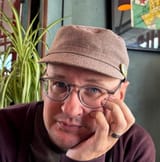Oceanside Countryside (2025)
not the disc from vol. III for some reason
It's extremely Neil Young to release an album with the same name as a disc from the recently released Neil Young Archives Vol. III, that contains many of the same songs, but for them to not be exactly the same. The Vol. III disc is a chronological representation of the time in which Neil made a tape called Oceanside Countryside, but including a couple things that didn't appear on the eponymous tape. This new release is the album he submitted at that time with this name, which contains a couple songs from the Vol. III disc (but not all of them). Yeah, it's confusing. I'll try to untangle it.
Oceanside Countryside is most analogous to the similar "lost" album Chrome Dreams: an album Neil assembled from bits and pieces, but then dissembled again to parcel out to subsequent albums: Comes A Time, Rust Never Sleeps, and Hawks & Doves. When I looked at Chrome Dreams, that's the thing that struck me the most, the way that album could have altered Neil's career drastically if certain songs had appeared on it. The way that it came together is emblematic of how Neil assembled albums during this time of extreme output. Lots of recording sessions, lots of takes, different moods, etc.
American Stars 'n' Bars was released in May 1977, but Neil was already recording new material in Tennessee at a studio called Crazy Mama's. "Field of Opportunity," "Dance Dance Dance," and "It Might Have Been" are from those sessions. Shortly after, he spent the summer playing with The Ducks and living in Santa Cruz. When the Ducks dissolved, he went to Florida (where his mother was living) and ended up recording a set of solo songs, overdubbing himself on various instruments, at a new studio called Triad. He put this stuff together and sent it to Reprise. Word came back that maybe he should consider overdubbing a full band on the Triad songs and that's how we got Comes a Time (despite that album eventually only having two songs from Triad).
The original solo Triad songs are the most compelling, giving us an alternate look of what became a band-focused album. I've come to really appreciate "Sail Away" after hearing the Ducks version, and I think I never paid it much mind because the Rust Never Sleeps version always felt a bit too saccharine. Stripped back without the band and Nicolette Larson, it's less romantic, and therefore sadder, especially with Neil harmonizing with himself instead. The overdubs are nicely done and it's amazing hearing what Neil could do just on his own in a studio. That's the real brilliance of the Triad sessions.
The sparse "Goin' Back" might be the biggest revelation. The Comes a Time version is so big and full, this acoustic-dominant version is so fragile sounding in comparison. Without the giant Gone With The Wind Orchestra, it's altogether different song to me. The production is more immediate, giving that special feeling of being in the room with Neil. "Human Highway" is a song I love, and the versions that always grab me are solo performances, so the Triad one is a lovely treat. I think ultimately the Comes a Time version is better (the banjo really sells it), but it's nice to hear Neil by himself on a song that I think means a lot to him.
Moving on to the May 1977 songs from Crazy Mama, "Field of Opportunity" is the same Vol. III version but with Neil doing his own backing vocals instead of with Nicolette Larson. Nicolette and Neil together are magic, so this is a slight downgrade. Although it's great hearing Neil straining in his unique way for certain notes. Poor "Dance Dance Dance." Neil had been recording and performing this song since at least 1969 (with Crazy Horse), but it never made it to a release until the Archives began. This is the same version as on Vol. III, despite marketing saying it was different. There is some confusion about that in general, as someone seems to think there's a version with Nicolette on it, but there isn't.
The cover "It Might Have Been" had been kicking around since 1970, but a recording of it didn't make it to an album until the live International Harvesters album A Treasure. This version is not dissimilar to the live rendition, perhaps a little more serious. I know it's a song that Neil loves, but I could do without it, personally.
While also worked on during the Triad sessions, "Lost in Space" here is the same insanity that appears on Hawks & Doves. Likewise, the fantastic duo of "The Old Homestead" and "Captain Kennedy" are unchanged from Hawks & Doves. The overdubbed "Pocahontas" is listed as being the same as what appears on Vol. III, which is a previously unreleased mix not dissimilar to Rust Never Sleeps. I still prefer the original Hitchhiker take, personally.
Despite the songs on this album being a compilation of previously released and/or virtually unchanged takes, I really enjoy this vision of the songs Neil was writing at the time. I can see how he would put this all together. It's a shame he let the record company talk him into overdubbing some songs and chopping this up, because this works better than both Comes a Time and Hawks & Doves. While the former is a really lovingly but overproduced album, the former is a bit of a mess, with too many throwaway songs on it for me. Which is a shame, because "The Old Homestead" and "Captain Kennedy" are fantastic songs that were sadly buried.

